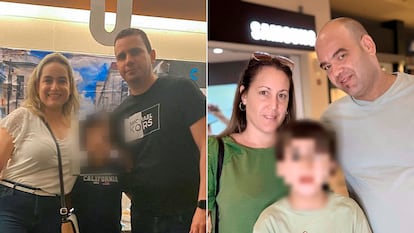Cuban mothers accused of child trafficking for bringing their children to the US: ‘It’s punishment for being migrants’
A dozen families find themselves in an immigration limbo by decision of one court in the Eastern District of Washington


Still unable to understand why, Betsy Segura was accused of smuggling her nine-year-old daughter into the United States. So was Irianna Gilimas, the mother of a nine-year-old son. One day, each one of them closed the door to their house in Cuba, didn’t look back, and took the long and well-trodden path of the migrant. They say they wanted to reach the United States, get a job, send their children to school, and help their families back home. Nothing that others haven’t done before them. But their story has turned out different. According to the U.S. government, they are not just mothers, but the traffickers of their own children.
“We never thought they would accuse us [of trafficking] for the simple fact of not abandoning our children, for bringing them with us seeking the same thing Cubans have sought for years,” says Gilimas, 36, speaking from her home in Miami. Segura, 37, a Houston resident, feels the same way: “They are accusing us of trafficking the girl when all we want is her wellbeing in this country. It’s very harsh; we are not criminals.”
Gilimas arrived in the United States in 2021, and Segura a year later. Like thousands of other Cubans, they fled the island at the beginning of what has become the largest migratory exodus in history, reaching nearly two million people in the last four years. They went through a pandemic that completely overwhelmed Cuban hospitals, closed the doors to tourism, and, combined with other factors, ultimately plunged the country into an economic crisis from which no one believes it will ever emerge. The solution was to leave. They did so, along with their husbands and children.
The United States literally opened its doors to them. Once at the border, both families were greeted by an officer who let them into the country. They were directed to detention centers, their documents were processed, and they were released with their respective paroles to the sound of “welcome.” Everything was going well. It was the guarantee they needed — after remaining in the United States for a year and one day — to be eligible to apply for the Cuban Adjustment Act, which has legally benefited several generations of Cubans since the 1960s. After the required time, they applied for their Green Cards.
But the letters that would change everything arrived more than a year after they had applied for permanent resident status. The day they heard from the United States Citizenship and Immigration Services (USCIS), it was to let them know that they and their husbands had been denied residency. Not so their children, who could regularize their status. Sometimes Segura’s daughter, who already speaks English and has adapted to a new life much more quickly than her parents, looks at her mother and asks, “Why me and not you?” Neither Segura nor her husband have the answer.
The notice came from the Eastern District Court of Washington, located in Spokane. USCIS authorities reported that the families had entered the United States illegally and had been detained by Border Patrol at or near the port of entry. Furthermore, they stated that “evidence indicates” they were “inadmissible” because they had engaged “in alien smuggling.” They also stated that they had violated the law by crossing the southern border with their children.
“This accusation of human trafficking caught us by surprise,” Gilimas says. “We didn’t know it existed; we had never known or imagined that we, as the child’s biological parents, could be accused of having smuggled him in. We’re married, we’re a family. I never thought of leaving my son behind; that wasn’t an option.”
The Department of Homeland Security (DHS) defines human smuggling as the “importation of persons into the United States through the deliberate violation of immigration laws.” The crime includes “bringing undocumented aliens into the country, as well as the unlawful transportation and harboring of undocumented aliens already in the United States.” The U.S. Sentencing Commission reports 17,336 cases related to immigration offenses in 2024, of which 25.1% were related to alien smuggling. 78.5% of those convicted were men, 81.2% were Hispanic, and 13.2% of the offenses were related to the illegal trafficking of unaccompanied minors. However, the Commission does not mention offenses related to accompanied minors, especially those traveling in the company of their biological parents.

Segura and Gilimas aren’t the only mothers in this situation. They say they’ve heard from more than a dozen families in this same immigration limbo, whose cases were also handled at the same Spokane office. “It’s a very serious accusation,” Segura says. “We are unfortunate to have ended up in that office, even though thousands of mothers have come across the border, even with children who are not their own, and have been granted residency.”
Immigration lawyer Willy Allen, who has handled four of these cases, maintains that this is “a punishment for being migrants.” “I think it’s an official abusing his power,” the lawyer told EL PAÍS. In 40 years of work, he had never seen a similar case in the Cuban community.
“I think someone in that office decided they were going to punish migrants for entering the United States, and what better way than to accuse them of trafficking their own children,” he maintains. Although Allen explains that illegal entry into the country “is always a criminal offense,” he also believes that officers “are enforcing the law like never before.”
Gilimas and Segura have already felt the brunt of this punishment. The former has not been approved for a work permit nor has she been issued a driver’s license that would allow her to work a few hours as an Uber driver. The latter fears that, once it expires, she will have to leave her position as a receptionist at a Hispanic clinic.
Both share the panic experienced by other migrants, up against a government that not only seeks to deport them, but to strangle them so they themselves choose to take the path back. “What they’re doing is driving us to despair. They don’t tell us to leave, but they don’t give us work permits or driver’s licenses. And so we can’t support our son,” says Gilimas. “If we can’t work, how can we get ahead? How do we pay the lawyers who defend our cases? The worst thing is that we have no idea of the magnitude of this, how far it can go.”
Sign up for our weekly newsletter to get more English-language news coverage from EL PAÍS USA Edition
Tu suscripción se está usando en otro dispositivo
¿Quieres añadir otro usuario a tu suscripción?
Si continúas leyendo en este dispositivo, no se podrá leer en el otro.
FlechaTu suscripción se está usando en otro dispositivo y solo puedes acceder a EL PAÍS desde un dispositivo a la vez.
Si quieres compartir tu cuenta, cambia tu suscripción a la modalidad Premium, así podrás añadir otro usuario. Cada uno accederá con su propia cuenta de email, lo que os permitirá personalizar vuestra experiencia en EL PAÍS.
¿Tienes una suscripción de empresa? Accede aquí para contratar más cuentas.
En el caso de no saber quién está usando tu cuenta, te recomendamos cambiar tu contraseña aquí.
Si decides continuar compartiendo tu cuenta, este mensaje se mostrará en tu dispositivo y en el de la otra persona que está usando tu cuenta de forma indefinida, afectando a tu experiencia de lectura. Puedes consultar aquí los términos y condiciones de la suscripción digital.








































